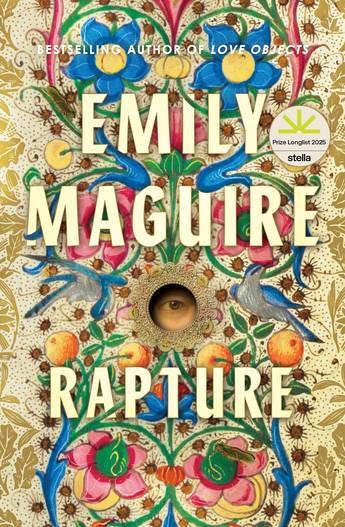I switched genres and it was such a good choice!
Why you should never stop writing—even when it feels like no one’s listening
For Emily Maguire, writing Rapture wasn’t just a genre pivot—it was a deep, nerve-wracking departure from the kind of fiction that had made her name. Known for her contemporary novels like Love Objects and An Isolated Incident, Emily dove into the ninth century to reimagine the myth of Pope Joan—a story of faith, identity, and quiet defiance.
In this week’s episode of Writes4Women, Mary-Lou Stevens sits down with Emily to unpack the fear, freedom, and fascination behind Rapture—and what it means to trust your voice even when it takes you somewhere unexpected.
Whether you’re drawn to historical fiction, wrestling with creative doubt, or simply trying to find your way back to joy in your work, Emily’s story is a reminder that sometimes your bravest book is the one you write for yourself.
🍿 For paid subscribers: Emily opens up about the long tail of recognition, how it felt to be shortlisted for the Stella and Miles Franklin after five books—and why it was her seventh that brought the deepest joy. She shares the role of mentors, the mind-bending process of writing historical fiction during lockdown, and how moving away from certainty brought her closer to something real.
Here are the top three takeaways from Mary-Lou’s conversation with Emily:
1. Stop Thinking “Genre”—Start Thinking “Story”📚
When Emily felt blocked writing historical fiction, it wasn’t because of research—it was because she was stuck in the idea of genre. Once she stopped writing a historical novel and simply wrote Agnes’s story, everything shifted.
💡 Takeaway for Writers: Don’t get trapped in the label. Start with your character. What do they want? What do they fear? What’s around them? The setting supports the story—not the other way around.
2. Doubt is Inevitable. Nerve is a Team Sport 🫂
Despite a decade-long career, Emily still struggled to hold her nerve with Rapture. What helped? A handful of trusted friends who got her. Who reminded her she could do it. That the story mattered.
💡 Takeaway for Writers: Doubt doesn’t mean you’re on the wrong path. It means you care. Find your people—the ones who’ll see your brilliance when you forget how to look.
3. Let Faith and Doubt Coexist 🌀
Rapture explores belief in all its forms—spiritual, creative, and personal. Emily didn’t write from certainty; she wrote from curiosity. Instead of knowing all the answers, she let the questions guide her: What if this voice is real? What if this story matters?
💡 Takeaway for Writers: You don’t have to feel 100% sure to write something worth reading. Doubt doesn’t disqualify you. It deepens you. Let the not-knowing be part of the process.
Connect with Emily Maguire
Connect with Mary-Lou Stephens
✨ Subscriber Bonus: The Mentorship, the Manuscripts & the Long Game
In the bonus segment, Emily dives deeper into the emotional and professional journey of becoming a “career writer”—from entering mentorships as a call-centre worker to receiving a call that she’d made the Stella list. If you’ve ever wondered whether it’s too late, whether it’s too hard, or whether anyone will ever see what you’re trying to say—this one’s for you.
💛 This full bonus chat is available for paid subscribers ($7/month) and includes behind-the-scenes access to more interviews, creative deep dives, and writerly real talk.
🎧 Get Inspired. Get Encouraged. Get Writing.
Happy writing! 🎉
Keep reading with a 7-day free trial
Subscribe to Writes4Women to keep reading this post and get 7 days of free access to the full post archives.








